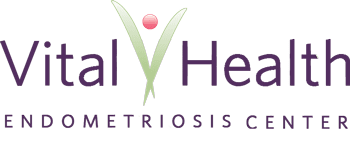We are coming to a point in medicine where we finally realize that becoming healthy means more than simply treating a particular symptom or disease. Treating illness doesn’t mean fixing just one part of the machine. In the Western medicine system model, each organ system is viewed and treated separately. This model fails to treat and manage complex chronic health conditions. Our bodies consist of an interconnected web of systems, not individually functioning parts. These bodily systems interact and influence one another. Therefore, to effectively treat complex medical conditions and optimize a patient’s overall health, we have to support him/her as a whole, look for root causes of disease, and untangle the web that has led to disease. This may require using a combination of treatment modalities.

To effectively treat endometriosis and optimize a patient’s overall health, we have to understand the bigger picture of a patient’s well-being and support her in all the ways that affect her health.
-Danielle Cook
For this reason, at the Vital Health Endometriosis Center, we coordinate and support a range of therapeutic options for our patients, including:
- Advanced minimally invasive endometriosis excision surgery
- Medical and/or surgical management of co-existing urogynecologic disorders
- Functional Medicine
- Comprehensive, specialty lab testing
- Dietary and nutritional medicine (nutrigenomics)
- Pelvic floor physical therapy
- Pain psychotherapy and counseling
- Pain management
- Body work
- Acupuncture and Emotional Freedom Technique (EFT)
- Meditation and mindfulness
- Hypnotherapy
Traditional Western medicine has evolved primarily into a disease-management system, treating one particular symptom of one specific disease. Modern medicine provides an amazing range of prescription medications, as well as high-tech procedures and surgeries. These are effective treatments for acute conditions such as a broken arm or heart attack. Unfortunately, many of these treatments are ineffective in treating and managing chronic health conditions such as endometriosis and irritable bowel syndrome. In order to successfully manage more complex, chronic health conditions, a more comprehensive, individualized approach to health and disease must be used.
Functional medicine seeks to do just this. Functional Medicine is a holistic, individualized approach to assessing, preventing, and treating complex chronic disease. It recognizes that chronic disease almost always begins with a slow, declining function in one or more body systems. The functional medicine practitioner evaluates the interaction between each person’s environment, lifestyle, and genetic predisposition to assess where dysfunction has occurred. Functional Medicine recognizes each person’s biochemical individuality. Treatment is patient-centered versus disease centered. Through individualized nutrition, physical activity, supplementation (as needed), stress reduction, and reducing environmental toxins, optimal health can be achieved.
| Traditional Western Medicine | Functional Medicine |
| The same diagnosis and treatment algorithms are applied to all patients. | Care is personalized for the individual. |
| Narrow focus: Specific symptoms and specific disease states. | Broad focus: Whole body. |
| Compartmental approach: Separate “autonomous” systems within the body. | Integrative approach: A web of interconnected, interrelated systems. |
| Goal: Disease management | Goal: Optimal patient health |
| Paradigm: Utilizes a drug(s) and/or surgical procedure(s) to resolve symptoms. | Paradigm: Observes how various factors within and outside the individual (genetic, epigenetic1, environmental, diet, stress, sleep, movement) interact to result in disease and unwanted symptoms. |
Underlying genetic, epigenetic, and environmental factors that may negatively influence health:
- An inflammatory diet and nutrient deficiencies
- Lack of regular movement and exercise
- Trauma and injuries
- Environmental toxins (e.g. dioxins, pesticides, heavy metals)
- Infectious agents (e.g. viruses, fungus/yeast, parasites, bacteria)
- Emotions, attitude, and spirit: the mind-body connection (e.g. anger, fear, depression, toxic relationships)
- Sleep deprivation
- Chronic stress
- Dysbiosis (imbalance of intestinal bacteria)
Bodily systems that are impacted by the above, which result in symptoms:
- Immunology (chronic colds and flus, poor wound healing, or autoimmune disease)
- Endocrinology (for example: sex hormone imbalance, blood sugar dysregulation, stress hormone depletion or elevation, thyroid disorders)
- Neurology (for example: depression, anxiety, insomnia, restless leg syndrome, impaired memory and concentration)
- Inflammation (for example: joint pain,interstitial cystitis, pelvic pain, gastrointestinal pain)
- Metabolism (for example: weight gain or loss, fatigue)
- Detoxification (for example: fatty liver, acne, poor estrogen clearance)
- Digestion and absorption (for example: nutrient malabsorption leading to deficiencies, heartburn, bloating, constipation/diarrhea, abdominal pain)
- Microbiology (for example: infections leading to any of the above symptoms)
- Coagulation (for example: increased clotting and scar tissue formation, joint pain, increased blood clots with menses)
This depends on a few key factors. How complex is endometriosis? Is it a benign pelvic disease or is it a marker of multi-systemic disease? We do not currently have answers to these questions, however, what we do know is this:
- Endometriosis commonly co-occurs with other gynecologic and urologic disorders, such as adenomyosis, fibroids, interstitial cystitis (painful bladder syndrome) and uterine anomalies.
- Women with endometriosis also often suffer from autoimmune and endocrine disorders, such as chronic fatigue syndrome, fibromyalgia, thyroid dysfunction, allergies, lupus, insulin resistance, and multiple sclerosis. Endometriosis is often referred to as a multi-systemic disease (MSD)2
- Endometriosis can have profound and ongoing negative effects on the mind and body. These include pelvic floor dysfunction, pelvic adhesion-related disorders, chronic inflammation, immune dysfunction, neuropathy and pain hypersensitization, and psychological distress (anxiety, depression, feelings of loss, feelings of isolation, poor stress tolerance).
Advanced, minimally invasive surgery is a fantastic tool for the effective removal of endometriosis and is an essential step in the journey toward healing. However, an integrative approach to endometriosis treatment offers the most comprehensive means of addressing all aspects of this disease in each individual patient. We at VHI believe that an integrative approach is necessary in order to achieve optimal health and quality of life.
Before going to Dr. Cook, I had 3 surgeries and no doctor fully understood my pain and concerns. Dr. Cook not only understood me, but he took the time to research some new possibilities for treatment in order to leave no stone unturned before going in for surgery with him.
-Megan

Notes:
1. Epigenetics is an emerging area of medical science that studies the role of environmental modifications to DNA that affect gene expression (whether a gene is activated or deactivated). Rather than resulting from changes in the actual DNA sequence, epigenetic factors affect the manner in which cells “read” the genes. Epigenetics explains why endometrial cells (the tissue that lines the uterus) look and behave differently from peritoneal cells (the tissue that lines the pelvic structures). While these cells have the same basic DNA, their genes are expressed differently, which ultimately determines the type of cell present and the cell’s activity. Endometriosis has become a target of study by epigeneticists, who hope to identify means of modifying gene expression in endometriotic tissue to change cell behavior and appearance.
2. Multi-Systemic Disease (MSD) refers to a family of clinical syndromes that share similar underlying dysfunctions of the body. These clinical syndromes would include such diseases as endometriosis, fibromyalgia, chronic fatigue, food and environmental sensitivities, some cases of interstitial cystitis, insulin resistance, hypothyroidism, allergies and autoimmune diseases, Lyme disease and associated infections, just to name a few. Genetic and environmental factors typically contribute to the specific clinical syndrome expressed.
